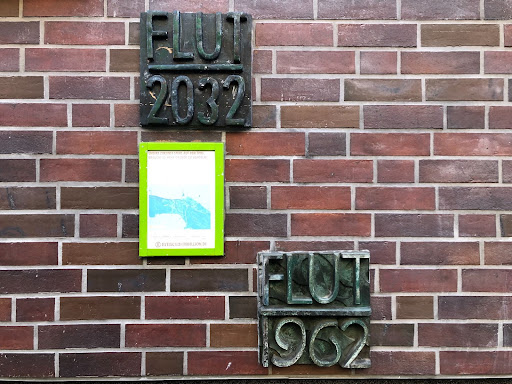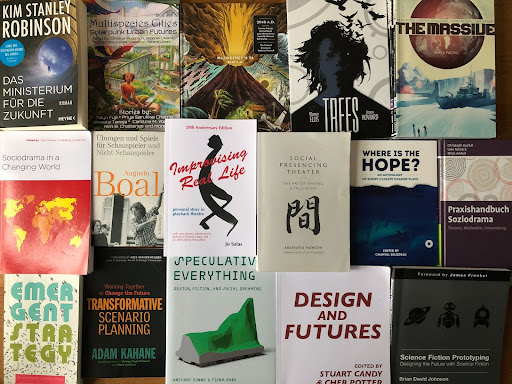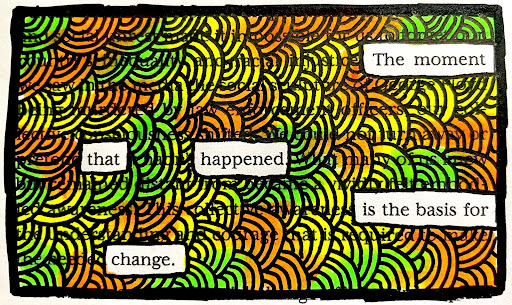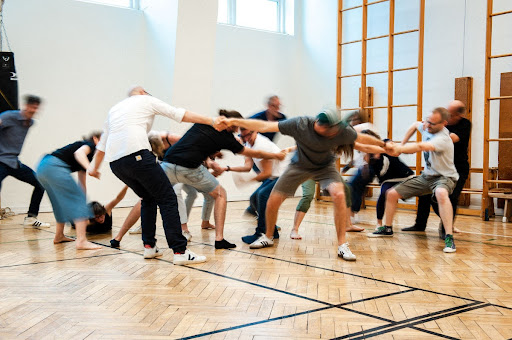by Jörg Jelden
When Solarpunk Gets into your Body
Imagine you don’t just watch ‘Don’t Look Up” on your own but experience and sense it with your full body, heart and mind – in the presence of others. Imagine not just reading ‘Ministry for the Future’ by Kim Stanley Robinson but playing with its words, taking on a role in the story and diving deep into its world and scenario. Imagine sharing the experiences and associations you had when reading/listening/watching a solarpunk story and seeing it being played back to you. This is what Climate Futures Action Explorations is all about. To actively explore climate futures in lively, playful, and experiential sessions based on drama and embodiment techniques.
In this article, I give a little background about why Valentin and I initiated this thing. Is it a series? Is it a platform, or an open format? Actually, we can see many possibilities for these ‘Climate Futures Action Explorations’, and we are very excited to see how all of this will evolve.
Futures and transformation
But let me begin at the beginning. Back in 2005, I started my professional life as a trends and futures researcher. I was fascinated by the transformative power that lies in dealing with the future, or futures to be more precise, and I was underwhelmed at how superficiallyour work was often used. I recall taking part in the Oxford Scenarios Programme in 2012. Adam Kahane visited to present his amazing book Transformative Scenario Planning. He talked a little bit about how scenarios helped to transition to post apartheid in South Africa but more in-depth about his follow-up engagement in Columbia in the late 90s. Juan Manuel Santos had invited him and all the relevant parties of the civil war for a scenarios process. Hearing Adam’s story about it created several goosebump moments. Like in South Africa, futures work was an essential part of the peace process. In 2016, nearly twenty years after the scenario process and four years after my encounter with Adam in Oxford, Santos won the Nobel Peace Prize for cooling down the civil war.
Why speculative work matters
Also around 2012, I became familiar with the mutual influence between speculative work like Science Fiction and real-world transformation and innovation. Speculative works demonstrate fictional products, new social paradigms, other worlds and so much more. As individuals as well as organisations or societies, we use speculative works to expand our imagination, shift the discourse and change our images of the future. We use them to reveal and question our underlying assumptions of the world. And our images of the future guide many of our actions and decisions of the present.
My favourite speculative piece is a little bronze medal in my hometown of Hamburg in Germany. On the river island of Wilhelmsburg, the local Extinction Rebellion group placed this fake flood mark to remember the victims of a flood in the year 2032 – a meter above the medal that reminds people of the deadly flood in 1962.

Decolonize the futures
But too often imagining these futures is a very privileged act. I became fully aware of that, when reading Octavia´s Brood and Emergent Strategy by Adrienne Maree Brown. She and others started initiatives to decolonize futures work and leverage it for climate and social justice movements. Inspired by the work of Octavia Butler, they offered sci-fi writing workshops for these communities and movements. In a recent interview Brown said: ‘I think that science fiction is a form of organizing, and all organizing is science fiction’.
Today we have many subgenres like climate fiction, solarpunk, or afrofuturism, … inspired by sci-fi, fantasy or horror. There is a vast and growing body of diverse speculative work – even though they are not mainstream. People like Evan Medd carry on the idea of Adrienne Maree Brown and offer courses in writing sci-fi stories for climate and social justice.
Action Explorations I
At some point in 2017, I stumbled upon action methods. I was looking for facilitation tools that help groups and communities to not only talk about issues, but experience them, sense them, feel them. I decided to dive deeper into sociodrama, an action method once developed by Jacob Moreno. In sociodrama, a group explores a topic by taking on roles within that topic and encountering each other in those roles. Thanks to Dr Ron Wiener and Di Adderley from iSCAN, I experimented a lot and learned fast. Playing with futures was always part of it. Very often we had sessions that were amazingly deep and full of energy and emotions. I experienced how people questioned their assumptions, groups created a deep common understanding and call to action. In 2019, my colleague Valentin and I started to run open sociodrama sessions in Germany around ‘organisations and the climate crisis’ – bringing together activists, scientists, consultants and people working in all kinds of organisations. I remember an activist reflecting on his role as a father and his need to also take care for his family and not only the planet. There was this employee of an oil company who started to attend XR meetings and quit her job after a sociodrama with us. And many more such experiences.
Action Explorations II
When Corona surprised us in 2020, we immediately started to offer open sociodrama sessions to help people understand the impacts of the pandemic. But we also learned how to effectively run creative, playful, emotionally touching and physically engaging sessions on Zoom. And suddenly, we had the opportunity to take on courses from all kinds of other action methods from all around the world. Virtual Constellations, Social Presencing Theater, Playback Theater, Theater of the Oppressed, Clowning – we have been learning so much and have met so many outstanding practitioners and facilitators.
When Valentin and I started Dandelion Spaces in 2021 to make space for more transformative, lively, and regenerative spaces for people who shape transformation, we came up with Climate Futures Action Explorations. But it stayed as an empty container until we read “Ministry for the Future” last fall. This fantastic masterpiece of near-future climate fiction let us dream of sessions that guide people deeper into cli-fi stories like these with our virtual action methods toolkit. To create virtual events that are more interactive than an author‘s reading, more lively than a piece of theater, film or book. But most importantly, to create spaces to expand our imagination towards positive climate futures.
From idea to co-creation
We started to talk to Uri Noy-Meir. Uri is an amazing facilitator and experienced social artist. Together, we started to discuss how we could integrate solarpunk stories or climate fiction in his course Unlock the News. Around the same time, we stumbled upon XR Wordsmiths‘ Solarpunk Storytelling Showcase and were blown away. This was just perfect: fresh and curated solarpunk stories by a climate justice movement we adore, and they are open to experiments and collaboration.

A first offer
Quickly, we set up a first prototype session on a Saturday evening in January. The XR Wordsmiths picked “The Park” by Adam Marx for this. Uri facilitated it using a mix of text-based work (Boal‘s Newspaper Theater) and embodied experiences (Social Presencing Theater). We started reading out the story, collectively playing with words, intonation, rhythm. Each participant chose 1-3 sentences that resonated deeply with her / him. In breakout rooms we read out these sentences and while the others offered shapes and movements. Back in the plenary, each group showed something. Then we shared what we saw, sensed and felt. Quickly the two hours of this session were over.
My take-aways
Working with “The Park” was quite challenging for me. I won’t give you a spoiler here, but if you read the story you can imagine why it was tough, being a father of two. What resonated strongly in me is the power of collective grieving and having space and place for it. In life, I experience most of the time that grief is considered an individual process. I was also amazed by the power of a statue/sculpture and how art can create action and deeper understanding among people. Reading the story, I imagined images of extinct species being put up on the statue within the story. Or statues that were torn down in 2020 by the Black Lives Matter movement, and how jealous and despising they might be concerning the statue of the girl in the park. After the session, I was left happy, thankful, touched and overwhelmed. And thirsty for other stories and different methods.
And what now?
Honestly, Valentin and I don’t have a great plan on how to proceed exactly. We dream of a momentum to bring cli-fi / solarpunk and action methods closer together and spark imagination and more activation to tackle the climate crisis. We would love to see as many stories of the Solarpunk Storytelling Showcase and beyond brought to life by action methods like sociodrama, Playback Theater, Social Presencing Theater or Theater of the Oppressed. We would love to see many different action method practitioners from around the globe working with these and other solarpunk stories. We would love to see this grow and create an avalanche. May this initiative help to further encourage people, organizations and communities to face this existential threat, and act towards futures that are more just and regenerative.
What‘s coming
We have scheduled two new sessions. On February 10. Noa Leibu and her ensemble Story Lane will offer a Playback Theater session for the story “Gabby´s First Kiss” by Joe Tankersley.
On February 25, my sociodrama teachers Ron Wiener and Irina Stefanescu will facilitate a sociodrama based on the story “Where Giants Will Stand” by Spencer R. Scott.
You can register for these sessions here. They are free of charge. There will be more sessions coming up.
Please contact Jörg or Valentin if you want to facilitate a session based on one of the stories in combination with action methods.


One thought on “Climate Futures Action Explorations”